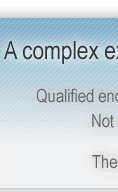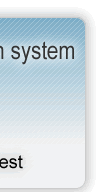 |
 |
||||||
 |
 |
 |
 |
||||
Exam is the basic element of the application and at elaboration of examination system, the main objective was the maximum supervision of as large as possible number of parameters. Exam is dynamically defined, i.e. user can define its frames as complexity, duration, number of questions from individual question pool etc. The power of the system is additionally manifested in the fact that the choice of questions presented to the attendee may always be different, because according to the set keys, questions are pulled out of the question base randomly or sequentially. It is, of course, possible not to take the opportunity of pulling out questions at random when it is necessary (like IQ tests).
|
|||||||
Exams Exams and their generating represent a significant part of the system. MyQtest system enables two basic types of exams: Question Pool Question pool is, as a matter of fact, a group containing a certain number of questions in some narrow sphere. This is at the same time also the smallest integral unit of the examination contents within the system. Such a granulation of groups of questions is extremely significant, as it enables composing complex exams by which knowledge in precisely defined spheres are tested, so that in testing knowledge in e.g. MS Word it is possible to establish that the attendant forms the text properly and finds his way around printing well, however is not skilled enough in creating tables... Complex Exam In creating a complex exam, it is possible to select specific number of questions from any question pool that will be presented to the attendant. Additionally, one can specify which and how many questions shall appear within the complex exam, respecting the complexity grades of each question within the pool. It is possible to decide how many questions of a certain complexity grade (four grades are predefined) of some question pool shall appear in the complex exam. In this way it is possible to define complex exams of various complexity grades. Each complex exam created in the system should consist of selected question pools. The fact that the result of each attendant shows in detail his knowledge of each segment of examination material, represents the additional value of myQtest. The criterion of passing the exam criteria can also be set in a few ways. It is possible to set pass criterion only upon overall percentage of success, but also one can require from the attendants to have 50% of level of success in total and at least 30% of level of success within certain segments (questions from some question pool) to pass. Also, pass criterion can be set so that attendant will pass if he/she has required percentage of points for each segment (questions from one question pool of the same complexity level).
|
|||||||
Exams Duration The specified time duration of an exam, may be limited to one of two ways, which further stipulates the way of presenting exam questions towards the attendant:
This way of adapting the duration of exam enables the user to return, in course of examination, to certain already answered questions, to alter or delete answers, to skip some questions and to mark them for a later repeated overview... System can, working this way, either let the attendant take and change each question as many times as desired within the total exam duration or let him/her only answer question one time or skip the question in the first pass. After the first pass student will, only once (second pass), be presented with the skipped questions and if some of them is skipped again there will be no chance to answer them any more (two pass system).
This way of adapting the exam supposes sequential answering to questions - one after another, without possibility of omitting certain questions, without returning to already answered questions ... Duration of each question is adjusted in seconds.
|
 |
||||||
Exams Availability Administrator of each single organization using myQtest system may determine within groups of users certain subgroups and for each of them adjust availability of a certain exam. In this way, some subgroup of users is obtaining the right to use some of the exams that is already prepared by the organization in a certain time frame. Subgroup is the smallest organizational unit in which attendants are grouped to take exam in i.e. same day. One attendant can be member of unlimited number of subgroups and he/she will take exam within a subgroup. Subgroup is a virtual organizational unit since i.e. 15 attendants can take the exam in the same subgroup but they are actually using the system from different locations since exam is conducted over the Internet. Subgroup can be referred to as a class in formal scholar system; one can be in one class at some time with some students and tomorrow in some other class with some other students… Additional adjustment of the following criteria is possible: a) Number of admittances to the exam b) Availability of exams Represents the time frame in hours and days from when ‘till when a certain exam is available to attendants of a certain subgroup. It is possible to arrange, that the exam is always available. c) Exam’s retake Represents the possibility to take exam only until you have passed it, if number of admittances is not “spent” yet. It can be arranged that an attendant can not take the exam once he/she have passed it, regardless of admittances number still left. If this option is used attendant will not be able to improve his/hers result simply by retaking the exam as many times as set in admittances number. d) Lock Represents the possibility of blocking the exam taking for period of days if attendant fails, even if number of admittances is not “spent” yet. This way attendant will not be able to take exam i.e. 10 times in one day (this is possible only if admittances number is 10 or more) but he will be forced to retake exam at least i.e. 4 days after the last unsuccessful attempt. Attendant will have to prepare for the next exam attempt better instead of retaking it only to try the questions.
|
|||||||
| Home Try online demo References Contact | |||||||